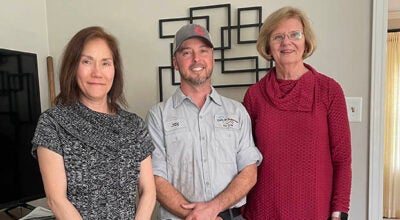DEQ approves ACP plan
Published 7:15 pm Monday, October 22, 2018
The Virginia Department of Environmental Quality (DEQ) approved the Atlantic Coast Pipeline’s (ACP) erosion and sediment control plans and stormwater management plan Friday, according to a news release from the DEQ and ACP.
“These detailed protection plans specify engineering designs that will protect water quality during and after pipeline construction along the 300-mile project that stretches from Highland County to Greensville County,” the release from DEQ cited.
“With the approval of these plans, Virginia’s upland Section 401 Clean Water Act Certification becomes effective,” the release cited. “The ACP project now has authorization from the Commonwealth of Virginia to begin construction. Final approval to begin construction is subject to approval by the Federal Energy Regulatory Commission, or FERC, which regulates the interstate transmission of electricity, natural gas and oil.”
ACP spokesperson Aaron Ruby said in ACP’s release that the company put in place some of the “strongest environmental protections ever used by the industry to keep soil and sediment out of our streams and rivers during construction.” The release from ACP cited that this was the final state approval needed to begin construction of the pipeline in Virginia.
“This is a major step forward for the project and brings our region one step closer to a growing economy, a cleaner environment and greater energy security,” Ruby said. “Thousands of hardworking Virginians and local businesses across the state will soon be hard at work building this transformational project.”
“Public utilities are depending on it to meet the growing energy needs of consumers and businesses,” Ruby said. “We’re eager to get to work in Virginia so we can build on the significant progress we’ve made in West Virginia and North Carolina.”
The pipeline is expected to be 600 miles, crossing Buckingham, Cumberland and Prince Edward with a 53,783-horsepower compressor station proposed to be located in Buckingham County.
Heidi Dhivya Berthoud with Friends of Buckingham said there are additional permits awaiting response from the DEQ in reference to the ACP compressor station.
The DEQ State Air Pollution Control Board held a public hearing for a draft air permit for the compressor station Sept. 11 in which more than 80 spoke. The DEQ, according to its website, will analyze the comments and present a report to the State Air Pollution Control Board during meetings Nov. 8 and Nov. 9 at the Greater Richmond Convention Center, Exhibit Hall Building, Level 2, Room E21-AB at 301 N. Third St. in Richmond.
Berthoud urged state government to consider the input from members of the public.
“We the people have struggled for four years to stop these pipelines, to protect our rights to clean land, water, air, to democracy – what good government should be doing all along,” Berthoud said.
The Virginia State Conference NAACP issued a release in opposition to the pipeline activity, citing the compressor station’s impact in the Union Hill community.
“We are also gravely concerned over the lack of fair and appropriate response to environmental injustices perpetuated by the approval and construction of these projects and ask that a more thorough and comprehensive analysis of potential negative and cumulative impacts to the natural and social environments be conducted,” the release cited. “Careful consideration must be made to properly identify residents located within the study area to ensure Title VI compliance and that there are no disproportionate impacts on burdened communities.”
Sharon Ponton, stop the pipelines campaign coordinator with the Blue Ridge Environmental Defense League, said in a statement Friday that concerns persist about the risk of pollution.
Virginia and West Virginia has suspended its Army Corps of Engineers stream-crossing permit for the Mountain Valley Pipeline (MVP), according to The Roanoke Times.
“Hundreds of concerned citizens and grassroots groups presented proof to Governor Northam, the Virginia State Water Control Board (SWCB) and the VADEQ these pipelines could not be built on our steep slopes without polluting our streams, rivers and water resources,” Ponton said. “Construction of the MVP in southwest Virginia has repeatedly proven those statements and studies to be true. Obviously, the Governor, the SWCB, and VADEQ learned nothing from their previous mistakes.”
“Governor Northam claims to be a leader on climate, but hides from his constituents, refusing to meet with directly affected communities,” chair of Buckingham-based Concern for the New Generation, Kathie Mosley said. “While he took a public stand against a proposed compressor station in Maryland which would tarnish the view from historic Mount Vernon, his lips remain sealed concerning my community, the historic African-American community of Union Hill. We will be forced to live with not only polluted water, but polluted air.”





